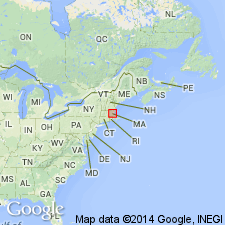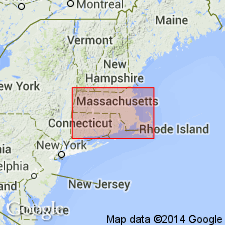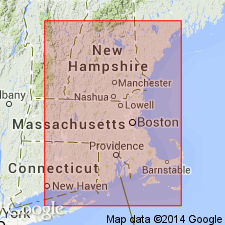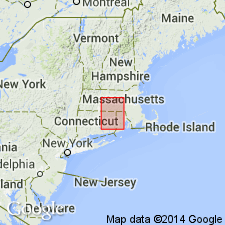
- Usage in publication:
-
- Southbridge Member*
- Modifications:
-
- Revised
- AAPG geologic province:
-
- New England province
Summary:
Rank reduced to Southbridge Member of Paxton Formation in MA. Age is Silurian.
Source: GNU records (USGS DDS-6; Reston GNULEX).

- Usage in publication:
-
- Southbridge Member*
- Modifications:
-
- Overview
- AAPG geologic province:
-
- New England province
Summary:
Used as Southbridge Member of Paxton Formation of Silurian age.
Source: GNU records (USGS DDS-6; Reston GNULEX).

- Usage in publication:
-
- Southbridge Formation*
- Modifications:
-
- Revised
- AAPG geologic province:
-
- New England province
Summary:
The Southbridge Formation of Pease (1972) is here assigned to the Paxton Group in CT and MA. It consists of schistose granulite with interlayers of schist and amphibolite typical of the conformably overlying Bigelow Brook Formation. Conformably overlies the Dudley Formation of the Paxton Group. The type section of Pease (1972) is here extended to include the lower part of the formation. Thickness at type section is 3,700 m (12,136 ft). Age is Late Proterozoic. [Because of delay in publication date, this report supercedes information in Pease (1989).]
Source: GNU records (USGS DDS-6; Reston GNULEX).

- Usage in publication:
-
- Southbridge Formation*
- Modifications:
-
- Revised
- Age modified
- AAPG geologic province:
-
- New England province
Summary:
The Southbridge Formation here includes strata formerly mapped in CT as the Hebron Formation and in adjacent MA as the Paxton Formation. It is assigned to the Paxton Group. A sillimanite schist member is described in CT; it is conformably overlain by biotite schist and gneiss. Age is Late Proterozoic(?) based on intrusion of 440 m.y. Hedgehog Hill gneiss into overlying Brimfield Group and an age of 1188 m.y. for detrital zircons from the Paxton. [Because of delay in publication date, information in this report is superceded by Barosh and Moore (1988).]
Source: GNU records (USGS DDS-6; Reston GNULEX).
For more information, please contact Nancy Stamm, Geologic Names Committee Secretary.
Asterisk (*) indicates published by U.S. Geological Survey authors.
"No current usage" (†) implies that a name has been abandoned or has fallen into disuse. Former usage and, if known, replacement name given in parentheses ( ).
Slash (/) indicates name conflicts with nomenclatural guidelines (CSN, 1933; ACSN, 1961, 1970; NACSN, 1983, 2005, 2021). May be explained within brackets ([ ]).

